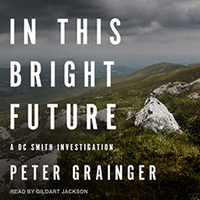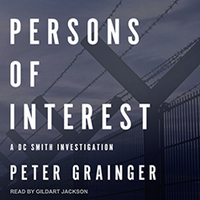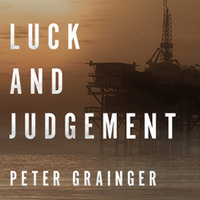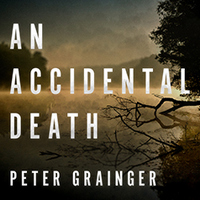
…this was, when you thought about it, typical of the places that Smith brought you to, of the situations that you could find yourselves in when working with him…He had these ideas which somehow seemed to be more than hunches and a way of making things happen before you realized it. Half suggestions would have momentum before you could blink.
I’ve said it before, and I’ll keep saying it until it’s no longer true* but there’s a certain magic, an ineffable alchemy about Jackson narrating Grainger’s work. It’s just fantastic, I think I’d have liked these audiobooks with another narrator (or in print), but I don’t think I’d have liked them as much. I’ve enjoyed Jackson’s narration before, but it was (no offense intended) good, not great. But you put the two of them together? It’s fantastic.
* I expect that will be roughly the time that one of them retires.
The downside here is, that I don’t have a lot to say beyond that. And it kind of drives me crazy. I made a couple of notes, but I’ve misplaced them (which is pretty annoying).
What’s Luck and Judgement About?
We start off with Smith and Waters taking a helicopter to an oil rig with some other police to investigate a death/missing person (the helicopter rides inject a much-needed bit of levity to keep the beginning of this novel from being too dark). Smith and Waters are really along for the ride, most of the work will be done by the others, but the victim was in Smith’s jurisdiction—as it the rig. Or close enough, so they have to come along.
The higher-ups and the executives on the rig are willing to write it up as a suicide, but are leaning on an unfortunate accident as the explanation. Smith, shockingly, isn’t convinced. Suicide seems unlikely for several reasons, and one would have to work really hard to get around all the safety measures, guard rails, fences, gates, and whatnot in order to have an unfortunate accident. It makes him no friends, but Smith is convinced (and is more so by the hour) that this is a homicide.
As bad as it is for the victim, their suffering is over—but for their survivors, the crime (if there was one) will affect their lives for years to come. In this case, we’re talking about his wife and a small child. They didn’t have a lot of money coming in before his death, but now, there’s nothing. A small apartment, little financial security, and nothing else. Without becoming maudlin, or focusing on them too much, Grainger does allow us to see how these events will alter their lives and what the future may hold for them. We got a little bit of that in the previous novels, but it plays a larger role this time. It’s a small thing, but one that’s too often over-looked in Crime Fiction.
There’s a new detective on the team, a transfer, and one that Smith has a hard time relating to—he’s trying to be cautious and make sure she’s acclimating. At the same time, he’s worried that he’s not using her, and that the best way to get her acclimated is to throw her in. With the rest of the detectives (including those he doesn’t appreciate), you don’t see him uncertain or reflective. So watching Smith trying to figure out how to manage someone is a new side to him.
That same detective plays a role in an undercover operation that Smith undertakes to follow a lead—it’s possibly the most comedic part of the series to date—while not really being that funny at all. Judge for yourself.
As much as Smith’s hunches, his intuition, might start his team down a road, or help him to see a connection that others miss, once he makes that intuitive leap to start an investigation, procedure takes over. I can’t think of another “police procedural” where the procedure is as effective as it is in these books. Smith and the team (mostly the team) grind and grind and grind, doggedly going through all the steps before them, and it pays off—at least to a degree. I really respect that as a narrative choice—sure, Smith’s (or someone else’s) intuition (experience guided by intelligence, as Nero Wolfe would put it) will sometimes help set the direction, but it’s legwork that gets it done.
What’s Going On Other than the Main Case?
Smith continues to work with the True Crime writer on that previous case of his, and a friendship develops between the two As an ongoing arc, this is a real slow burn, and I’m enjoying it, as much as I don’t understand what Grainger is up to. I’m assuming instead of a B (or C) story, this will eventually become the A story for a novel—maybe the last in the series? But unless this is just going to demonstrate that Smith’s biggest case ever was his biggest failure and he’s going to have to find the real killer now, I’m not sure I see how.*
* Okay, I just came up with a half-baked idea where it would work, but I’ll hold off on that idea until it can get solidified.
Lastly, it’s time for Smith to be recertified as physically fit to carry on his duties. He’s missed two previous opportunities to qualify and he has no choice but to show up for this one. It feels pretty personal, the DCI who’s had it in for him since before the series started seems to be using this to force him out. The reasons he missed the previous two are legitimate reasons, and the DCI just looks petty for forcing his hand like this. But then when doesn’t this guy look petty? In the last book, he tried to get Smith to transfer to another office, and that didn’t work, so this is his new attempt. It’s short-sighted and small-minded to force Smith out, but the dies have been cast. While the new assignment was being dangled in front of Smith, a private-sector job was also offered—the lengths (the questionable, reckless, and likely illegal) that Smith goes go to pass this test demonstrates how un-tempting he actually found the offers last time, no matter what he may have thought. Smith loves this kind of police work and will have to be forced into retirement, kicking and screaming.
So, what did I think about Luck and Judgement?
So much for the three paragraphs that I was hoping to come up with for this post, I guess, eh?
I pretty much gave that away in my first paragraph, didn’t I? There is something about the combination of Grainger’s novels and Jackson’s performance that make these books so satisfying. Are they the best written, most exciting and suspenseful Police Procedurals? No. But they are just about the most satisfying, most immersive, most effective that I can think of—even when the ending isn’t what you’d want. There is a strong sense of humanity in these books, not just in the protagonists, but in the victim, the killer, the witnesses, the people who aren’t the killer but who aren’t up to anything legal/moral/ethical…everyone. There’s no one cartoon-y or over the top (in any direction). You just don’t see enough of that.
I was sucked into the intricacies of this case and thoroughly enjoyed spending time with Smith and the rest of the team—and I can’t wait to return to this world.

This post contains an affiliate link. If you purchase from it, I will get a small commission at no additional cost to you. As always, opinions are my own.




![]()








 A book recommended by someone you trust.
A book recommended by someone you trust.
